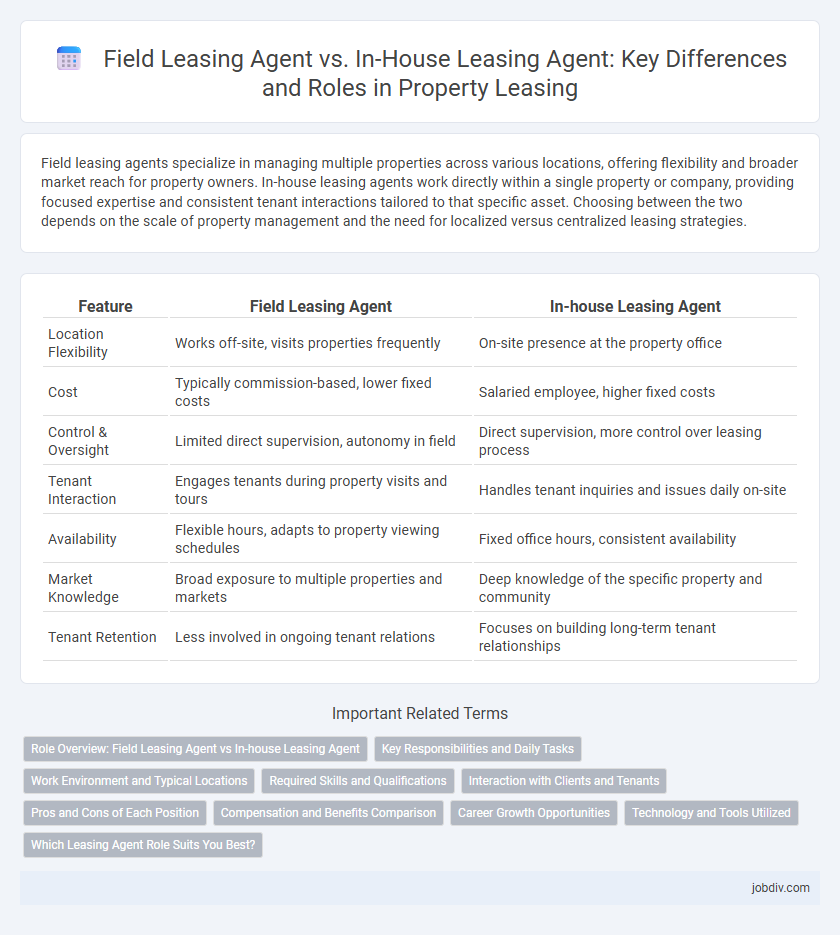Field leasing agents specialize in managing multiple properties across various locations, offering flexibility and broader market reach for property owners. In-house leasing agents work directly within a single property or company, providing focused expertise and consistent tenant interactions tailored to that specific asset. Choosing between the two depends on the scale of property management and the need for localized versus centralized leasing strategies.
Table of Comparison
| Feature | Field Leasing Agent | In-house Leasing Agent |
|---|---|---|
| Location Flexibility | Works off-site, visits properties frequently | On-site presence at the property office |
| Cost | Typically commission-based, lower fixed costs | Salaried employee, higher fixed costs |
| Control & Oversight | Limited direct supervision, autonomy in field | Direct supervision, more control over leasing process |
| Tenant Interaction | Engages tenants during property visits and tours | Handles tenant inquiries and issues daily on-site |
| Availability | Flexible hours, adapts to property viewing schedules | Fixed office hours, consistent availability |
| Market Knowledge | Broad exposure to multiple properties and markets | Deep knowledge of the specific property and community |
| Tenant Retention | Less involved in ongoing tenant relations | Focuses on building long-term tenant relationships |
Role Overview: Field Leasing Agent vs In-house Leasing Agent
Field leasing agents specialize in off-site property tours, client prospecting, and market analysis, enhancing tenant acquisition through direct community engagement and competitive positioning. In-house leasing agents operate within the property's management office, managing lease documentation, conducting on-site showings, and providing immediate customer service to facilitate leasing processes efficiently. Both roles optimize occupancy rates but differ in client interaction dynamics and operational focus within leasing management.
Key Responsibilities and Daily Tasks
Field Leasing Agents conduct property tours, engage prospects off-site, and handle market outreach to attract tenants, maximizing exposure through in-person interactions. In-house Leasing Agents manage tenant inquiries, process applications, and coordinate lease documentation primarily from the leasing office, streamlining administrative and customer service functions. Both roles require strong communication and negotiation skills but differ in their focus on external prospect engagement versus internal operations management.
Work Environment and Typical Locations
Field leasing agents operate primarily on-site, visiting multiple properties such as apartment complexes, commercial buildings, and retail centers to engage directly with prospective tenants and manage leasing activities remotely. In-house leasing agents typically work within a centralized office environment, often located at a single property or corporate headquarters, where they handle inquiries, process applications, and coordinate leasing logistics. The mobile nature of field leasing agents contrasts with the stationary, office-based work setting of in-house agents, impacting daily routines and interaction dynamics.
Required Skills and Qualifications
Field leasing agents excel in strong communication, negotiation, and customer service skills, often requiring mobility and adaptability to various leasing environments. In-house leasing agents typically need expertise in property management software, detailed lease administration, and maintaining tenant relations within a centralized office setting. Both roles benefit from knowledge of fair housing laws and a background in real estate or property management certifications.
Interaction with Clients and Tenants
Field leasing agents engage directly with clients and tenants at property sites, providing personalized tours, addressing immediate concerns, and facilitating on-the-spot lease signings to enhance tenant satisfaction and expedite leasing cycles. In-house leasing agents typically manage communications via phone, email, or virtual platforms, maintaining ongoing relationships by coordinating leasing processes, answering inquiries, and processing applications from a remote office. The choice between field and in-house leasing agents impacts the level of face-to-face interaction and responsiveness, influencing tenant experience and retention rates.
Pros and Cons of Each Position
Field leasing agents offer the advantage of direct community engagement, fostering strong tenant relationships and providing on-site problem resolution, which can enhance tenant retention and satisfaction. However, they often incur higher travel and operational costs, and their effectiveness can be limited by geographic constraints. In-house leasing agents benefit from centralized support and resources, improved coordination with property management teams, and reduced travel expenses, but may lack the personal touch and immediate presence in the field that can impact tenant rapport.
Compensation and Benefits Comparison
Field leasing agents typically receive higher base salaries combined with performance-based commissions due to their direct interaction with multiple property sites and external clients. In-house leasing agents often benefit from more stable compensation packages that include fixed salaries, comprehensive healthcare benefits, paid leave, and opportunities for internal career advancement. While field agents may enjoy greater earning potential through commissions, in-house agents gain consistent income security and additional perks such as retirement plans and employee discounts.
Career Growth Opportunities
Field leasing agents often experience faster career growth due to direct client interaction and hands-on property management across multiple sites, providing diverse industry exposure. In-house leasing agents benefit from stable environments and deeper knowledge of specific property portfolios, which can lead to specialized roles in asset management or corporate leasing strategies. Both roles develop valuable skills, but field agents typically gain broader market insights that enhance advancement potential within real estate firms.
Technology and Tools Utilized
Field leasing agents leverage mobile technology platforms and cloud-based tools to manage property showings, track leads, and communicate with prospective tenants in real-time, enhancing efficiency and responsiveness on-site. In-house leasing agents primarily use centralized property management software and CRM systems accessible from the office, enabling streamlined tenant screening, lease processing, and document management through integrated digital workflows. Both roles benefit from advanced leasing tools, but field agents prioritize mobile applications for on-the-go tasks, while in-house agents utilize desktop-based solutions for administrative coordination.
Which Leasing Agent Role Suits You Best?
Field leasing agents excel in on-site property marketing, tenant interaction, and rapid issue resolution, making them ideal for dynamic environments with multiple locations. In-house leasing agents offer consistent tenant support, detailed knowledge of property policies, and streamlined communication within a single property or portfolio. Choosing the best leasing agent role depends on your strengths in mobility, interpersonal skills, and preference for either direct tenant engagement or centralized management.
Field Leasing Agent vs In-house Leasing Agent Infographic

 jobdiv.com
jobdiv.com